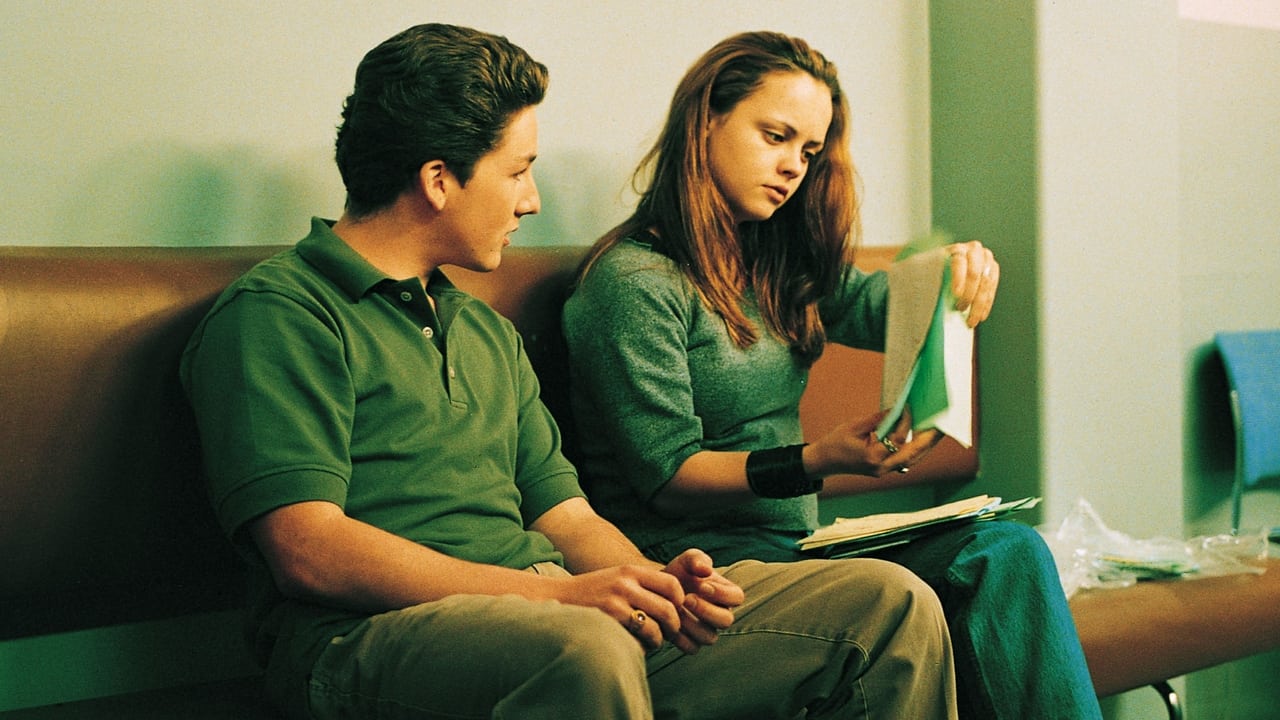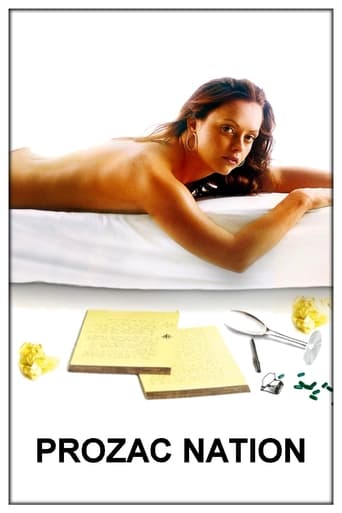robert-temple-1
This is an extremely harrowing, intensely dramatic film, based on the autobiographical book by Elizabeth Wurtzel, published in 1994 and which was an international bestseller. The film contains two spectacularly brilliant lead performances, one by the 20 year-old Christina Ricci as Elizabeth Wurtzel, and the other by Jessica Lange as her mother. The intensity of the emotional outbursts emanating from both of them during the course of this story is such that it is like watching atomic bombs explode up close, and you worry about the radiation poisoning and collateral damage. You look around the room to see if the furniture is still there or has been disintegrated. If it is still there, you can't be sure it will be for long. Ricci is 33 now and has already made 64 films, nearly two for every year of her life, but considering she started at nine, that is 2.66 films for every year of her active career so far. She is spreading as fast as Japanese knotweed, and is as ineradicable. Is there anyone who has not been amazed at her by now? But, not to be outdone, Jessica Lange does the most hysterical telephone screaming scene in the history of the cinema in this film, and I wonder how many phones she smashed, considering that one died for each take. Really, Ricci and Lange are in fierce competition in this film for who can be the most hysterical. Ricci wins, but then her character is the really crazy one, and Lange's is only partly crazy. The character of Elizabeth is totally convincing, and alas for those of us who have had experience of genuinely crazy people at close quarters. I have never known a girl who 'had it as bad as' Elizabeth, but I have known less acute cases with similar symptoms. Central to her condition is a manic narcissism, such that other people only exist as penumbras who are more or less in focus depending upon whether they are useful or obstructive to the narcissist's chosen path and aims (which may either be insane or may possess a kind of insane logic to them, so that it is only the premises which are insane). There is no doubt that spoilt brats are excellent recruits to narcissism, and one of the revealing scenes in this film is where Lange confesses to Ricci that after her husband (Ricci's father) abandoned them, she first 'lost it' but then refocused on Ricci and her daughter 'became everything to me'. Those parents who try to fulfill their own emotional needs and compensate for their own inadequacies by using their children as tools can indeed create monsters. It is just such boys from affluent families who, as spoilt brats converted into total narcissism, go and shoot their schoolmates in all those American school shootings. And by the way, such spoilt brats have killed far more people than the 'Boston bombers', but because those are foreigners, they can become a national issue, whereas the home-grown spoilt brats who shoot their schoolmates are quickly forgotten because they are far too embarrassingly 'boys next door' and 'one of us'. Well, Elizabeth Wurtzel was also 'one of us' who went completely crazy, but somehow she seems to have pulled herself out of the depths of madness and described her story in the most amazing way. It really is an incredible feat, what she has done, and an equally incredible film has been made of it. The tragedy of it all is that the psychiatric care seems to have been entirely useless (the psychiatrist played by Anne Heche barely speaks and just stares at Ricci), and the only thing which was able to bring Wurtzel under control was the drug Prozac. The film informs us that in 2000, 300 million prescriptions for Prozac and other similar tranquilizer drugs were dispensed in America, which is more than one per head of population. That certainly is a good ad for Big Pharma. But it is not a good ad for Americans. Are they really all as crazy as that suggests? And have they all been reduced to drugged zombies who are sleep-walking through life? What does this say about the quality of democratic participation? If you are drugged up to the eyeballs, are you really fit to enter a polling booth? Another disturbing revelation this year, 2013, concerns the new psychiatric diagnostic clinicians' manual known as DSM-5. According to a television report on that, the new manual circulated to all psychiatrists in America vastly expands the categories of psychosis. According to the new criteria, a person is allowed two weeks of grieving time after the death of a spouse or other close loved one, and if after that extreme grief continues, the person is considered to be psychiatrically ill and could in theory, I suppose, be institutionalized. At least everybody now knows how to ration their grief, since if you extend it to 15 days you may risk being taken away by the men in white coats and put into a straight jacket, as 15 days of grief is more than your permitted quota. But of course America is still 'a free country', and hence everyone is perfectly free to grieve for 14 days without penalty. Isn't that kind of the authorities, to allow 14 days of free grief before they start charging for institutionalization? That's what is called a merciful society. After all, there may be societies elsewhere in the world where only 13 days is permitted, and that would be very Un-American, thus proving that foreigners do not understand democracy. And also, according to the television report, 25% of the American population are now classified as mentally ill, and 20% are on psychoactive drugs. Well, that is what the TV report said. It also said that 69% of the people who drew up the DSM-5 have financial links with drug companies. Clearly no conflict of interest there!
the_wolf_imdb
Well. There is saying "There is nothing more efficient to break the confidence than Jewish mother". I quite didn't understand that until I have meet some families with Jewish ancestry and very, very pathological relationships between mothers and daughters. Mothers are typically very demanding, cold to daughters but full of self pity and perform emotional scenes to their daughters full of blame and incredibly poisonous mix of love and hate. The daughters feel mix of hate and guilt to mothers, they feel they are not "up to the expected standards". They would like to set themselves free, but they cannot, because they are tied to their family very strongly. Every guy who tried to get between the mother and daughter in this fight felt he lives in hell house. Everyone had to leave this hell house sooner (the boyfriend) or later (the father). This is portrayed very realistically in the movie. The pathology is here and what is worse it propagates from one generation to the next generation. Unfortunately no pill is solution to this sort of pathology. It removes the pain but not the wound itself.On the other hand the movie fails completely as the description of depression. Depression is not hysterical run to destruction and self destruction as shown in the movie. Depression sucks all the energy from people and leaves them optically calm, until something bad happens (suicide attempt). I know about several suicides of young people, usually "out of the blue", because these people were so depressed that they were not able to communicate their depression and seemed "only tired or ill" to the others. This was very sad because help from psychiatrist could actually save their lives. Not a single case was similar to the movie, usually even parents did not see what was coming, not even their friends.So, this is not movie about depression and "problem than haunts US". It is movie about inability to reflect herself or to get any insight into her situation (the part about "swallowing the lover" is especially pathological and shows total narcissism and selfish personality). There is no movement to good, no progress, only pills that replace other drugs and alcohol to hide the problem. This is description of utter failure to resolve or achieve anything, she is as damaged at the end as she was in the beginning. The idea that someone could try to find something of use for his life from this movie is actually very frightening. Very, very bad example, please see this as only warning how to NOT proceed on therapy!
Maki
I haven't read the book, but I certainly will since in my experience book is always much better than the following film.The only criticism I have for this film is that the ending is somehow sudden. I was so into the film and when it'd finished I felt like someone had cut the film's last 10 minutes.I'm the 4th year student of psychology and psychotherapy and in my opinion the story showed depression like it really is with some people suffering from it. That's why I want to read the book too.The film concentrates at the present crisis of the main character Elizabeth with a few glimpses into her childhood. She just started university. Going to college alone is considered stressful event and one of the normal crisis in life (as is for example pregnancy, retirement etc.) and can be a trigger for depressive episodes (combined with other factors).I was really impressed with how the film presented mother-daughter and daughter-boyfriend relationship and the state of mind of a depressed person. The relationship with her father, her emotions for him and vice versa are less developed. But all important psychological elements were covered. The usual behavior of parents who have children with similar illnesses is there. The powerful desire depressed people have for someone to save them is also showed in the film. Also the hardness of being friends or in some other way close to depressed person.And acting - I'll just say bravo! I also like the following point in the film - if you're suffering from depression, seek help, from family, friends, but especially professional help! And if you really feel that professional help is not good enough for you seek further. It's treatable! (Btw, don't use just drugs) It's not that depressed people don't have power to deal with it alone when they seek help - no one else can win that fight for them. It's about support and guidance through the black clouds of their mind and Pan's labyrinth but the real steps and decisions are made by them.

